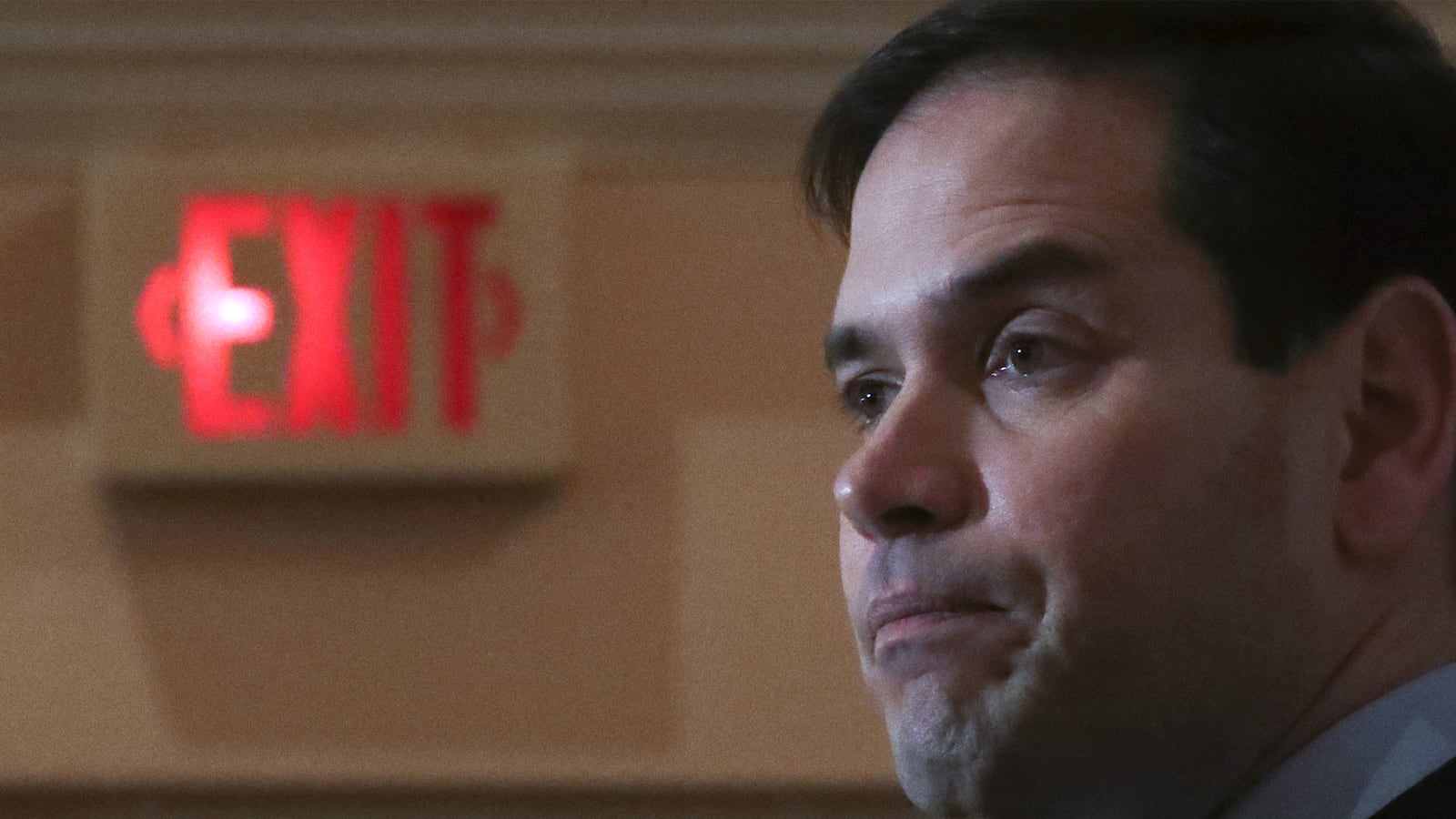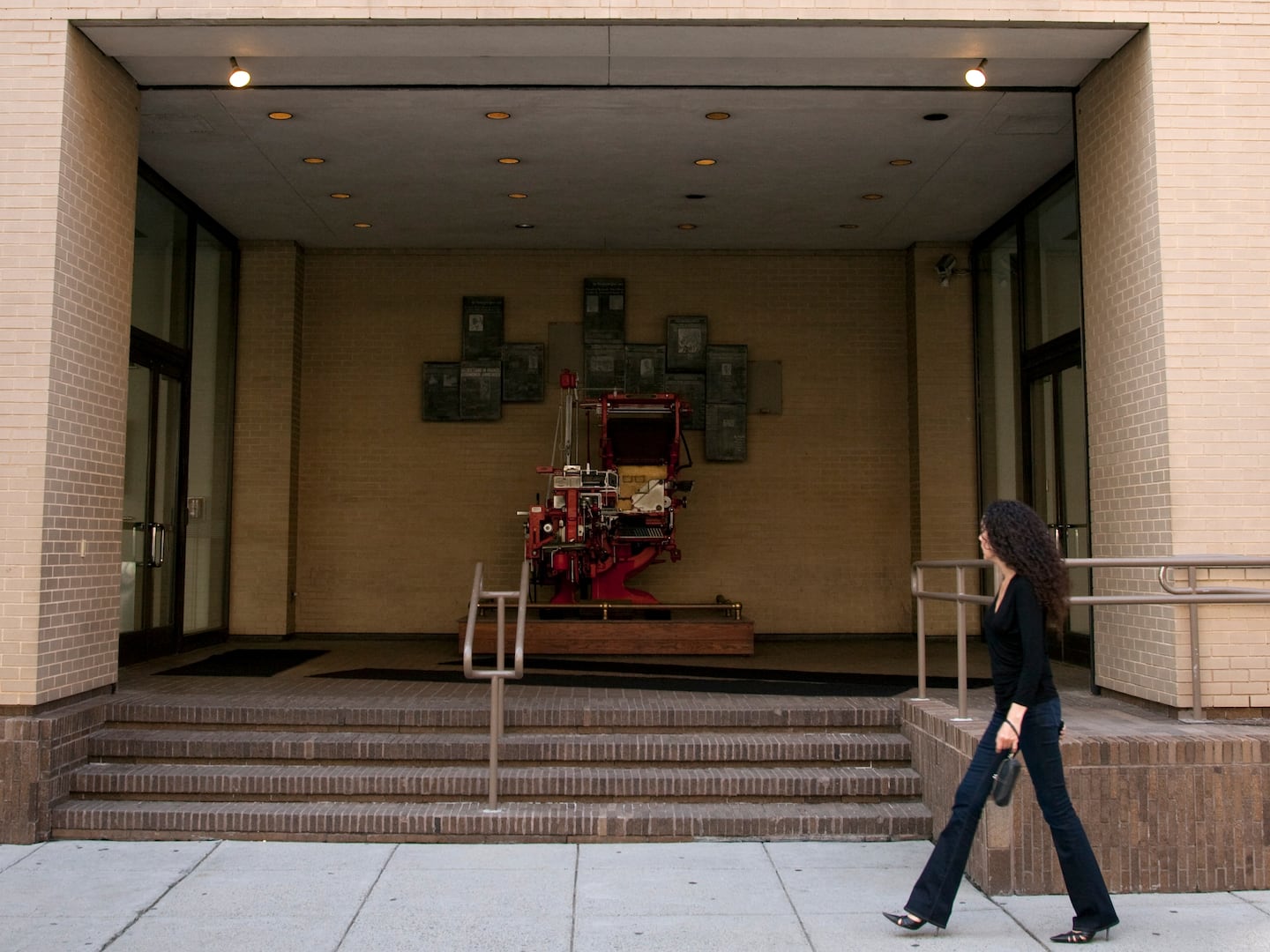If Sen. Marco Rubio loses the Florida primary next Tuesday, it won’t be because of the number of campaign offices he opened or the TV ads he didn’t buy.
Instead, it likely will be because of the kind of senator that Rubio’s Florida constituents believe he has been. Frustrated residents of several coastal Florida communities say they see a man who is friendly but unread, ambitious but unengaged, and widely discussed nationally but almost entirely absent from his own state as it suffers from an ongoing ecological and economic disaster.
“We have a Flint, Michigan, going on here in Florida in slow motion and Marco Rubio hasn’t done shit,” says Marty Baum, executive director of the Indian Riverkeeper in Jensen Beach, Florida. Baum is the sort of salty environmentalist you’d expect to criticize a Republican senator. But he’s a lifelong Republican, angry with what he sees as a disaster unfolding in front of him and few leaders, especially Rubio, doing anything to stop it.
The Flint-like catastrophe Baum is referring to is the routine inundation of some of Florida’s most precious waterways with polluted water from Lake Okeechobee in Central Florida. The controlled water releases by the Army Corps of Engineers are meant to preserve the Herbert Hoover Dike, which surrounds the massive lake, from breaching or breaking.
But unusually heavy rains in the last several years have seen the Corps sending up to 2 billion gallons of water per day west toward the Gulf of Mexico and east toward the Atlantic Ocean. Heavy with pollution from agricultural runoff, the eastward freshwater flows into the brackish waters of the St. Lucie River, the Indian River Lagoon, and eventually to Atlantic Ocean, where it was never meant to be.
The result has been massive algae blooms, brown tides, and the transformation of the water from a faint beige transparency to sludge the color of a strong cup of coffee. Sixty percent of the plant life has died off. Manatees and dolphins are dying at an alarming rate. Tourists to Florida’s famed Treasure Coast are warned from one day to the next not to touch the water lapping up on the shore.
Like any man-made disaster, there is plenty of blame to go around and Rubio had nothing to do with the long-ago decisions that caused the Indian River Lagoon crisis in the first place. But the sentiment in and around the area seems to be that as Rubio criss-crossed the country in his presidential bid, he has been nearly absent from working to find a federal solution to the emergency many of his constituents are facing.
A spokeswoman for Rubio’s office told The Daily Beast that Rubio “has strongly advocated for solutions to the Indian River Lagoon crisis and many other water issues throughout the state.” She also shared a list of the steps Rubio has taken since the crisis became severe three years ago, including a visit by Rubio to Stuart, Florida, in 2014 and a flyover tour of the affected area in 2015.
The senator also co-sponsored a bill to fund Everglades restoration and wrote or added his name to several letters fellow senators about the crisis. He hosted a conference call in 2014 and last year worked with Rep. Patrick Murphy to transfer a federal project to Florida officials for water storage. In the days before the primary, Sen. Jim Inhofe, who has endorsed Rubio (and calls climate change a hoax), told the Miami Herald that Rubio had convinced him to support the Everglades restoration project.
But it is the work that Rubio has not done and the meetings he has not attended that have left the local communities demanding more. When Gov. Rick Scott and Sen. Bill Nelson toured the area in 2013 as the crisis began, Rubio was a no-show. Months later, when Reps. Murphy (D-FL) and Trey Radel (R-FL) organized a congressional briefing on the emergency, 22 members of the House and Senate, including Nancy Pelosi, attended. Rubio did not. Since his 2014 visit to Stuart, Rubio has not been back. For much of 2015 and all of 2016, he has been on the campaign trail in Iowa, New Hampshire, and other earlier voting states.
Last year, the Treasure Coast Newspapers, which cover the crisis extensively, called Rubio “AWOL” on discussions and proposals for a solution. “[Rubio] has largely abandoned Florida and those who pay his salary,” the editorial board wrote. “If he thinks he can run for president and count on Florida supporting him, based on his current record he may be severely disappointed.”
Last month, the Naples Daily News, which has documented the effects on the Gulf Coast, urged voters to remember Rubio’s performance when considering who to choose in the Tuesday’s primary. “When it comes to visibly addressing this issue, critical to the region, there’s been a Washington no-show: Republican Sen. Marco Rubio.”
The Naples paper made the same connection as some Floridians in blaming Rubio’s longtime political benefactors, the Fanjul family, as a motivation behind what they see as Rubio’s inaction.
The family’s Fanjul Corporation was the second-largest source of individual donations to Rubio’s 2010 Senate campaign, while the family-owned sugar company, Florida Crystals, has given $371,000 to Rubio’s presidential campaign, according to the Center for Responsive Politics.
Florida Crystals has also opposed multiple attempts by the state of Florida to buy the land south of Lake Okeechobee to relieve water releases into the Indian River Lagoon. That land has long been used to farm sugar.
“The discharges from Lake Okeechobee have totally ruined the wildlife and ecology in the Indian River Lagoon,” said Richard Martinson, a retired New York firefighter who now lives on the banks of the St. Lucie River. “And Marco Rubio has done nothing but take money from big sugar.”
Although the contaminated water on the Treasure Coast is not a source for drinking, it is the source of much of the region’s economy. The Daytona Beach News-Journal estimated the Indian River Lagoon’s economic impact at $3.7 billion, a number locals say is dropping every day that the crisis continues.
Capt. Rodney Smith, a professional angler and the president of Anglers for Conservation, said he and other fishermen used to talk about ways to conserve the Indian River estuary, which is the most bio-diverse of its kind in North America.
“Now we have to ask how we will restore it. It’s dying right before our eyes,” he said from his home on Satellite Beach. “I have not seen Rubio say a dang word about this.”
Dan Neumann, the co-owner of Coastal Paddle Boarding in Stuart, Florida, gets water test results every Wednesday from Martin County officials. If the water tests safe, he rents paddleboards to his customers.
“But when the results are bad,” he says, “we can’t operate here. That screws me out of business.”
He also hasn’t heard anything from Rubio.
“I have no idea where he stands on any of this,” Neumann said. “I try not to do anything political because the whole thing makes me sick. I think we should just hit the reset button on this election because it’s like, really? These are our choices?”
The ultimate judgement from Rubio’s constituents will come on Tuesday. The latest CNN/ ORC poll shows Rubio trailing Donald Trump by 14 points. PPP's newest Florida Republican poll has Rubio losing to Trump by 20.
It can’t come soon enough for Marty Baum, the Indian Riverkeeper.
“I hope he gets killed in the Florida election,” Baum said. “It will tell the nation something when his own state hands down rejection to him.”
Baum did not say who he’ll be voting for, but it won’t be Marco Rubio.






